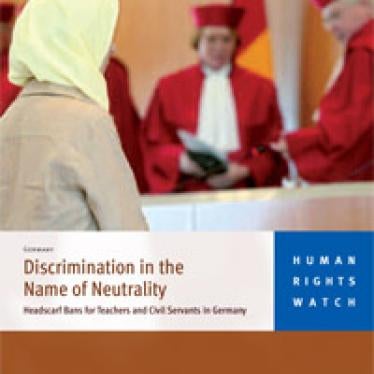(Geneva) - The recent vote in Switzerland to ban minaret construction violates the rights of observant Muslims to manifest their religion in public and reflects mounting anti-Muslim sentiment in Western Europe, Human Rights Watch said today.
On November 29, 57 percent of those voting in a national referendum endorsed a constitutional amendment to ban the future construction of minarets in Switzerland. The campaign for the yes vote, led by the Swiss People's Party, was marked by rhetoric against Islam and Muslims. A campaign poster showed minarets appearing to launch, like missiles, off the Swiss flag behind a woman wearing the niqab (a full-face veil leaving only the eyes visible). The Swiss government, which opposed the referendum, is required by Swiss law to draft legislation to amend the Constitution in line with the popular vote.
A ban on minarets denies Muslims the right to manifest their religion and is discriminatory. The right to manifest one's religion in public, through worship, teaching, practice, and observance, is an integral part of the right to religious freedom, guaranteed by international human rights treaties, such as the International Covenant on Civil and Political Rights (ICCPR) and the European Convention on Human Rights, both of which Switzerland has ratified. Both treaties also prohibit discrimination on the grounds of religion.
States are permitted to limit the right to practice or display religious belief only if they can demonstrate a need to do so to protect public safety, public order, health, or morals, or the fundamental rights or freedoms of others. None of these justifications apply to the Swiss ban on minarets, Human Rights Watch said. By targeting one religion, without any legitimate justification, the ban is clearly discriminatory.
The UN High Commissioner for Human Rights and the UN expert on religious freedom have condemned the vote as discriminatory and a violation of the fundamental right to manifest one's religion. The UN Human Rights Committee, which monitors compliance with the ICCPR, warned Switzerland in October that a minaret ban would violate the treaty. The ban is likely to face legal challenges in Switzerland and could eventually be examined by the European Court of Human Rights.
The vote is a deeply worrisome expression of growing intolerance toward Muslims across Europe, Human Rights Watch said. The vote has already galvanized far-right parties across Europe. The Danish People's Party, Vlaams Belang in Belgium, Italian Northern League, and the Dutch Party for Freedom immediately praised the vote and pledged to pursue similar initiatives in their own countries.
Conflicts over mosques also do a deep disservice to the important goals of combating discrimination and encouraging integration of Europe's newer communities, Human Rights Watch said. While in some cases there may be legitimate local dynamics and regulations to consider concerning the construction of religious buildings, the most vocal opponents often cast the issue in terms of defending Europe's Christian heritage or preventing Islamic radicalism. By presenting Islam as a dangerous interloper, these arguments stigmatize Muslims and feed into routine discrimination against Muslims.
A major survey commissioned by the European Union's Fundamental Rights Agency in 14 European countries found that one in three Muslims had experienced some kind of discrimination over the past 12 months. One in 10 said they had suffered a racially motivated assault, threat, or serious harassment at least once during that time. The vast majority never reported the incidents, lacking confidence that they would get help.
All European countries, including Switzerland, should uphold their values of human rights and tolerance, Human Rights Watch said, and in particular their commitment to freedom of religion and to ending all forms of discrimination on the grounds of religion.







